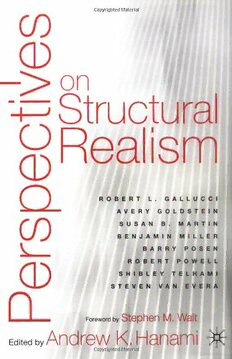
Perspectives on Structural Realism PDF
251 Pages·2003·1.05 MB·English
Most books are stored in the elastic cloud where traffic is expensive. For this reason, we have a limit on daily download.
Preview Perspectives on Structural Realism
Description:
Realism remains a predominant and most debated theoretical approach in International Relations research. Whether considered a scientific and accurate reflection of world politics or as reactionary and a distortion of realities and possibilities, both realism and its structural variant continue to be a source of fruitful research—whether within the program or in its rejection. The Realism approach itself is not uniform whether in relation to its implications or methodologies. Here leading scholars provide important perspectives on the insights and directions of Realist research in some of its most interesting variants. From rational choice to case studies, from theory to practice, the contributors explore both classic tenets of Realism as the balance of power and such apparent inconsistencies as foolish policies.
See more
The list of books you might like
Most books are stored in the elastic cloud where traffic is expensive. For this reason, we have a limit on daily download.
